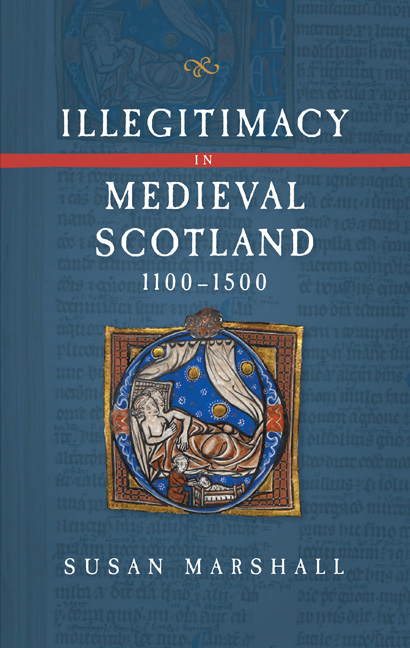Book contents
- Frontmatter
- Dedication
- Contents
- List of Tables
- Preface
- Acknowledgements
- Abbreviations
- Introduction
- 1 Church law and Scottish Families
- 2 Illegitimacy and Inheritance
- 3 Illegitimacy and Royal Succession I: Before the Great Cause
- 4 Illegitimacy and Royal Succession II: from the Great Cause to James I
- 5 Wives, Daughters, and Sisters
- 6 Church Careers and Sacrilegious Bastards
- 7 Illegitimacy in Political Life
- Conclusion
- Appendix I Scottish kings and their illegitimate offspring
- Appendix II Illegitimate sons of Scottish kings
- Timeline of key events
- Bibliography
- Index
Appendix II - Illegitimate sons of Scottish kings
Published online by Cambridge University Press: 26 March 2021
- Frontmatter
- Dedication
- Contents
- List of Tables
- Preface
- Acknowledgements
- Abbreviations
- Introduction
- 1 Church law and Scottish Families
- 2 Illegitimacy and Inheritance
- 3 Illegitimacy and Royal Succession I: Before the Great Cause
- 4 Illegitimacy and Royal Succession II: from the Great Cause to James I
- 5 Wives, Daughters, and Sisters
- 6 Church Careers and Sacrilegious Bastards
- 7 Illegitimacy in Political Life
- Conclusion
- Appendix I Scottish kings and their illegitimate offspring
- Appendix II Illegitimate sons of Scottish kings
- Timeline of key events
- Bibliography
- Index
Summary
It is probable that some illegitimate royal children of medieval Scotland are unknown to us, either because of poor record survival, or because arrangements made for them were never recorded in the first place. Among the publicly acknowledged offspring, for the most part we know only about those who survived to adulthood, but surely some illegitimate children, like their legitimate counterparts, died before gaining maturity. Before those of James IV, illegitimate daughters appear in our records mainly in relation to their marriages. References to illegitimate sons, while also appearing in connection with grants of land, or payments from the royal coffers, are additionally visible as participants in their fathers’ military campaigns, or occupying roles associated with royal government, or pursuing careers in the Church.
The birth of any child provided reassurance of paternal fecundity, but the arrival of sons tended to be especially welcome, as signifiers of masculinity and God's favour. Those born before their fathers’ marriages may have been viewed as a highly promising sign that male heirs would follow. William the Lion's son, Robert of London, was born around sixteen years before William's marriage and perhaps twenty-eight years before his heir, Alexander, made an appearance. The year in which Robert of Liddesdale, illegitimate son of Robert I, was born is not known with certainty: it may have been just before the birth of his daughter in marriage, or it may have been a few years after this event, but it was certainly over twenty years (and perhaps around thirty years) before the king's legitimate son and heir was born. Both of James IV's illegitimate sons, Alexander and James, had been born before he married Margaret Tudor; their first son, who died in infancy, arrived some fourteen years after Alexander's birth.
These four illegitimate sons were treated particularly well by their fathers. As far as the overall picture is concerned, paternal support and generosity was variable. The reasons why some sons fared better than others are hard to discern, suggesting that at least some of the factors were personal to the individuals and relationships concerned.
- Type
- Chapter
- Information
- Illegitimacy in Medieval Scotland1100-1500, pp. 199 - 209Publisher: Boydell & BrewerPrint publication year: 2021

